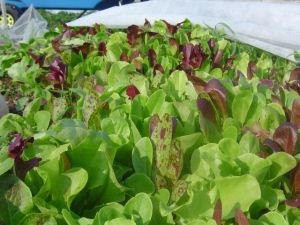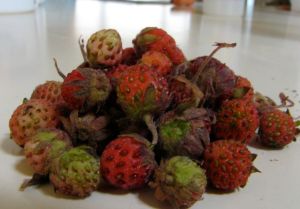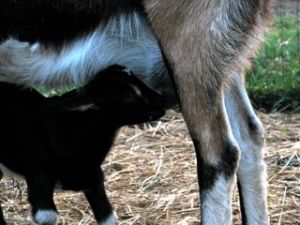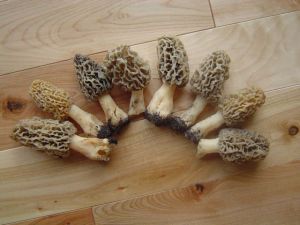I was recently contacted by a writer of a natural parenting section in a UK magazine called, “Junior”. She had questions that many of us who are parents often have about kids and food. How do we best feed our kids keeping in mind the environmental and social impact? How do we teach them to be mindful of this and will attempting to do these things only make the issue of food more of a battleground than it already is?

This summer's early lettuce crop
Anyone who has kids knows that feeding them can get exceedingly complicated and frustrating. One week they like something, the next they can’t stand it on their plate. What’s a parent to do? Is there anyway to get your kids on board with the big picture of ecotarianism without making things even more complicated? I think there is. In fact, I think there is an advantage in using ecotarian ideas to help kids become more adventurous eaters. So with that, her questions and my answers below, (or you can check out the article in the April 2009 article of Junior…it’s the world’s finest parenting magazine).
How do you get your kids involved in your ecotarianism? Is there stuff they can do with you to get them on board?
Absolutely.
First of all, answer their questions. Kids have a natural, (if not somewhat obsessive) desire to ask “why”. Combine that desire with their innate desire, (seemingly equally obsessive) to pick apart and examine everything they eat and you have a natural lead-in to talking about where food comes from. Does your child ask, “What is this?” when you put dinner in front of them? First breathe and count to ten and then see it as a teachable moment and actually start answering that question. It’s not only a great way to get your kids on board with what’s for dinner but also on board with the understanding that food comes from somewhere and it’s important that we know how it got to our plates.
Use every shopping trip as a teachable moment. Talk about where the food comes from, how it was grown and how it got to that market. If you don’t know, ask the farmer or the store clerk. Sometimes there will even be information printed at the stores. Get your kids thinking backwards -not just where will this food end up (at dinner) but how did it get here. Ask your kids to help you shop. As they get used to the dialog you have with them about their food ask them to start “helping” you to make choices about what you buy. Let them choose a fruit or vegetable they’ve never tried before. Show them a banana and a local strawberry and tell them you would like a fruit that didn’t have to travel very far and you need their help. Tell them how smart they are when they get the answer right!

Wild Strawberries
Grow something! Grow anything! Find a container, a garden, a plant or a seed, some dirt, water and a sunny spot and grow something. Find someone who knows more than you to bounce questions off of. If you cannot find anyone, there is a wealth of information on the Internet on just about problem you may run into. Even if you can’t bring your tomato plant to fruiting maturity, your kid’s will at the very least, see how something grows and what that tomato looked liked when it was merely a sparkle of potential in a tomato seed. You can even harvest a seed from many store-purchased tomatoes! From my experience, even the pickiest eaters will walk into my garden at the end of the summer and eat a fresh and sun-warmed plum tomato off of the vine. If you are successful with your growing endeavor and do get some fruit for your labors make sure to get some generic matching produce from the store so you can do a one-on-one taste comparison. Then start asking a ton more questions about why your produce tastes different than what you purchased at the store. Some vegetables that are easy to grow in somewhat small areas are tomatoes, beans, peas, carrots, (a short variety) and leaf-lettuce. Leaf lettuce is especially easy to grow and harvest . Just pick and eat when the leaves are big enough. Strawberries also grow quite nicely in containers and small spaces of earth. One of my favorite places to get seeds is Seed Savers. They have hundreds of varieties of heirloom plants and seeds from around the world as well as a beautiful and garden-inspiring catalog.
Visit where the food begins. Many farmers are happy to help young children understand what they do. Let your child see you pay the farmer for their products or even better, let your child give the farmer the money. Use this to begin a conversation about paying people fairly for their work.
Make something from scratch. We are often extremely disconnected from our food. Make bread, noodles, peanut butter, yogurt, cheese, (fresh ricotta is superbly simple besides, then you can sing “Little Ms. Muffet”) or a delicious desert from the very basics. Then when you have other foods start asking your children what ingredients they think are in them. Make it a guessing game. Ask, “Who knows which of the things we are eating has flour in it? Where does flour come from?” “What else do we use flour for?” or even “Who knows which of the things we are eating had to travel the furthest?” My kids have become pretty good at figuring this out and it makes for great dinner-time conversation!
I could go on and on with ideas but the biggest thing is questions, questions, and more questions. Kids are born wanting to ask them so use this opportunity to indulge that desire a little and get them really thinking. Help them develop the patterns that they need to continue asking important questions about more difficult issues later in life. To take on an ecotarian view of the world, you have to be comfortable wrestling with the often complex ideas of how, when, why and where when dealing with consumption.

Baby goat nursing, (we use the extra milk)
What are your words of wisdom to other parents who would like to take the ecotarian plunge but may feel a little overwhelmed?
First and foremost, try not to view ecotarianism as a series of black and white issues. Sometimes the decisions may be easy and sometimes the decisions may be very gray. Our food system did not get to where it is in just a short while and it will take time, effort and a lot of small changes on the part of individuals and systems for it to change for the better. It may seem as though we have a lot of choices at the grocery but in reality, our food system is not set up in a way so that we can even know a lot about the origins of our food. We have a lot of information about our food but often not that kind of information. So, in reality, if you are trying to take on ecotarian principals, your choices are quite limited. These two things combined, our existing food system and lack of pertinent information at the store, can definitely leave you feeling overwhelmed. So take it slow and give yourself time. Find something you can start with. Local produce, honey and dairy are often the easiest to find, (and delicious as well). Also, we, as consumers, can begin asking for that kind of information and transparency with our food. With a little pressure, we’re sure to get it.
Don’t let this issue make you feel guilty, (as if we need any more guilt as parents). Guilt is a terrible motivator and it doesn’t often lead to real change. We also cannot afford to make this a platform on which we can place ourselves so that we can judge how others are doing. That is completely missing the point. It’s not about keeping up with the Jones’s, it’s about making informed food choices that in turn make this world a better place to live in and keeps our families healthy. We are all coming to this from different places in life with different sets of resources. That will change the way in which we can approach ecotarianism. Some may be able to throw out their entire pantry and start over. Others will have to take it a piece at a time. Some may be able to till up an acre of their land and plant a huge garden. Some may have the power to advocate for rooftop gardens on commercial buildings. Others may be able to grow a garden plant in a windowsill of an apartment while others try to make their produce purchases at a local farmers market. Starting anywhere is good. To change the system we have to change as individuals. We can’t afford to waste time and energy judging each other on our progress. We should spend that time and energy encouraging the changes, big or small, we see in each other!
And for parents where food is already a battleground with their children – is taking on the principles of ecotarianism going to make life even more complicated?
I find that taking on the principles of ecotarianism is actually much more simple. Simplicity can in some instances, be quite complicated. However, on the issue of “food as a battleground”, I think it makes matters much easier. I really believe, from my own experience with my children and others, that kids are willing to eat good food. A strawberry in the middle of the winter shipped from thousands of miles away doesn’t taste as good as a sun-ripened local summer strawberry. Any child will know that even if they can’t express it. You might find that a child who “doesn’t like” tomatoes really doesn’t like tomatoes that have been grown a distance away and were not allowed to ripen on the vine and develop the natural sugars and sweet taste. Good for that child! He has a great natural instinct for good nutrition! Will this child be hesitant to try any other tomatoes if his first tomato experience was tasteless and out of season? Of course. Initial food experiences make a big impression on kids. However, give them several chances to try that naturally grown produce and you may be pleasantly surprised when on one occasion, they finally eat it. With that, I think it is very important that our children’s initial food experiences be good. And that means as natural and as flavorful as nature, (not agribusiness) intended. There is no better way to do this than taking on ecotarian principals, (fresh, natural, local) while choosing food.

Wild Foraged Morel Mushrooms
I really think what makes a toddler suddenly pick through something he’s been eating fine for months is a developing awareness of his food. He wants to know what he is consuming. Isn’t that what ecotarianism is all about? Use that, (sometimes irritating) trait for good. When kids know more about their food they are more likely to “trust” it again and often more willing to try new things. If we train our kids to love fresh, natural, local foods, if we also impress upon them that farmers are valuable and need to be compensated fairly they will be more likely to refuse the impostors in the food system as they mature. That, in turn, will lead to real change in how our societies eat.